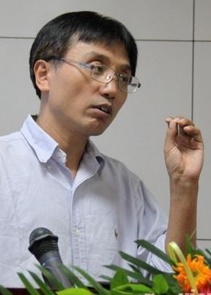2018华东师范大学产业组织与行为经济学会议
2018 ECNU Industrial Organization and Behavioural Economics Workshop
March 14, 2018
上海市普陀区中山北路3663号理科大楼A1716室
3663 North Zhongshan Rd., Science Building A, Rm. 1716
Shanghai, 200062, China
9:15 - 9:30 | Opening Speech |
9:30 - 10:30 | Keynote 1: Klaus Schmidt You Owe Me |
10:30 - 10:50 | Break (20min, Coffee, Tea & Snacks) |
10:50 - 11:50 | Ming Jiang When Do Stable Matching Mechanisms Fail? The Role of Standard Tests in College Admssions Binglin Gong Cooperation through Indirect Reciprocity: Impact of Higher-Order History |
11:50 - 13:30 | Lunch Break |
13:30 - 14:30 | Keynote 2: Monika Schnitzer How Antitrust Enforcement Can Spur Innovation: Bell Labs and the 1956 Consent Decree |
14:30 - 15:30 | Chaohai Shen Collusion Detection at Forest Service Timber Sales Chu Wang Entry, Settlement and Litigation under Sequential Innovation |
15:30 - 15:50 | Break (20min, Coffee, Tea & Snacks) |
15:50 - 16:50 | Keynote 3: Chunlei Yang Endogenous Rewards Promote Cooperation |
9:30 - 10:30
Klaus Schmidt: You Owe Me
Abstract: In business and politics, gifts are often aimed at influencing the recipient at the expense of third parties. In an experimental study, which removes informational and incentive confounds, subjects strongly respond to small gifts even though they understand the gift giver’s intention. Our findings question existing models of social preferences. They point to anthropological and sociological theories about gifts creating an obligation to reciprocate. We capture these effects in a simple extension of existing models. We show that common policy responses (disclosure, size limits) may be ineffective, consistent with our model. Financial incentives are effective but can backfire.
10:50 - 11:50
Ming Jiang: When Do Stable Matching Mechanisms Fail? The Role of Standard Tests in College Admssions
Abstract: In this paper, I investigate matching problems where priorities and preferences are misaligned. In the case of centralized college admissions, students are matched based on their test scores in standardized tests (priorities), a noisy realization of their aptitudes (colleges' preferences) due to measurement errors. I show that in this case any matching mechanism that is stable with respect to priority is not stable with respect to preference. The resulting instability leads to market unravelling. However, a manipulable mechanism such as the Boston mechanism, combined with limited information about priorities, may succeed in mending this market failure. I then design and conduct a laboratory experiment where I compare the performance of two mechanisms (the Boston mechanism and the Deferred Acceptance mechanism), under two timing conditions of the submission of students' rank-ordered lists of colleges (before the exam and after the exam), using a market design with both one-sided centralized matching and two-sided decentralized early admissions. In the experiment, the Boston mechanism under pre-exam submission condition performs better than the Deferred Acceptance mechanism in reducing market unravelling, which confirms the theoretical predictions.
Binglin Gong: Cooperation through Indirect Reciprocity: Impact of Higher-Order History
Abstract: Indirect reciprocity based on certain reputation systems is an important way to promote cooperation when repeated interaction becomes rare under globalization. Theoretically, coherent notions of reputation scores require knowledge of higher-order histories. Yet, how people use the acquired higher-order information to aid cooperation decisions is an open empirical question. We study a random-matching Prisoners’ Dilemma experiment with optional history information up to the second order, i.e. including the partner’s own previous partners’ action history. With the help of our newly defined continuous extension of some well-known reputation scores, we are the first to find that some simplified versions of standing and judging significantly affect the cooperation decision. More than half of subjects prove to be responsive to the higher-order scores, which also comes along with a certain payoff advantage. The positive reputation effect is much stronger when people have first played the baseline PD games without history information, where vanishing cooperation is inevitable. Under such a condition, subjects are also inclined to be more cooperative when both parties display high reputation scores.
13:30 - 14:30
Monika Schnitzer: How Antitrust Enforcement Can Spur Innovation: Bell Labs and the 1956 Consent Decree
Abstract: Is compulsory licensing an effective antitrust remedy to increase innovation? To answer this question, we analyze the 1956 consent decree which settled an antitrust lawsuit against Bell, a vertically integrated monopolist charged with foreclosing the telecommunications equipment market. Bell was forced to license all its existing patents royalty-free, including those not related to telecommunications. We show that this led to a long-lasting increase in innovation but only in markets outside the telecommunications industry. Within telecommunications, where Bell continued to exclude competitors, we find no effect. Compulsory licensing is an effective antitrust remedy only if incumbents cannot foreclose the product markets.
14:30 - 15:30
Chaohai Shen: Collusion Detection at Forest Service Timber Sales
Abstract: This paper examines bidding in U.S. Forest Service first price timber auctions in the Northern Region, where the potential for collusive bidding has been recognized. I modify the empirical methods in Porter and Zona (1993) and find a group of potentially cooperative (PC) bidders, who can submit complementary bids. Benefiting from a striking feature of data, where sealed bid auctions and ascending bid auctions were used side by side, I find further corroboration for my findings by analyzing PC bidders' bids in ascending bid auctions.
Chu Wang: Entry, Settlement and Litigation under Sequential Innovation
Abstract: We study a patent holding incumbent’s incentives to litigate, settle with, and accommodate a new market entrant with a quality improving product. Patent protection is uncertain and is characterized by a patentability standard and patent breadth determined during litigation. While litigation has the benefit of blocking an infringing product, it carries a risk of patent invalidation. As a result, the incumbent accommodates large improvements, which are both less likely to be infringing and more differentiated from the incumbent’s product. Litigation occurs for incremental improvements, while settlement take place for moderate improvements, which are sufficiently differentiated from the incumbent’s product, but whose litigation is still preferred to accommodation. Improving the incumbent’s market position by increasing the quality of his product or the strength of his patent strengthens his litigation incentives, but it can also benefit the entrant since a stronger incumbent mitigates market competition from inferior non-patented product variants. As a result, we find that an entrant’s innovation incentives may be higher if the current leading product on the market is protected by a patent.
15:50 - 16:50
Chunlei Yang:Endogenous Rewards Promote Cooperation
Abstract: Sustaining cooperation in social dilemmas is a fundamental objective in the social and biological sciences. While providing a punishment option to community members in the public-goods game (PGG) has been shown to effectively promote cooperation, this has some serious disadvantages; these include destruction of a society’s physical resources as well as its overall social capital. A more efficient approach may be to instead employ a reward mechanism.
We propose an endogenous reward mechanism that taxes (at the rate of 20%) the gross income of each round’s PGG play and assigns the amount to a fund; each player then decides on how to distribute his or her share of the fund as rewards to other members of the community. Our anonymous mechanism successfully achieves a high level of contribution (about 70%) with budget-balanced (1:1) rewards that require no external funding, an important condition for realistic implementation. Our results are consistent with the higher contribution levels under endogenous rewards being driven by two key components: First, a strategic response to reward formation can help avoid the no-contribution outcome. Second, conditional cooperation plays a crucial role in maintaining high levels of public-goods contributions.
主旨报告人介绍

Klaus Schmidt是德国慕尼黑大学讲座教授,世界计量经济学会(Econometric Society)及欧洲经济学会(European Economic Association)院士,曾任哈佛大学、加州大学伯克利分校、耶鲁大学、斯坦福大学和麻省理工学院访问教授。Schmidt 教授研究领域跨越经济学众多子学科,包括行为与实验经济学、合同理论、博弈论、产业与组织理论、劳动经济学、拍卖理论和政治经济学等。他研究成果显赫,在世界顶级的经济、管理和金融学期刊上发表了近五十篇论文,其中包括顶级期刊American Ec. Review, Econometrica, Quarterly J. of Ec., Review of Ec. Studies;A类期刊 J. of Finance, J. of Ec. Theory, Management Science, J. of European Economic Association, Economic J., Rand J. of Ec. 等。其中Fehr and Schmidt (1999, QJE), “A Theory of Fairness, Competition and Cooperation,”是行为与实验经济学引用最多的几篇文章之一。曾任European Economic Review主编及Review of Economic Studies, Management Science, J. of European Economic Association, Rand J. of Economics等副主编。

Monika Schnitzer 是德国慕尼黑大学讲座教授,曾任哈佛大学、加州大学伯克利分校、耶鲁大学、斯坦福大学和麻省理工学院访问教授。曾任2013-2016德国经济学会主席;2016年欧洲经济学会(EEA)年会组委会主席;1998-2006,J. of Industrial Ec.及 German Economic Review副主编;2005-7欧洲经济学会执委。主要研究领域是产业组织及公司组织理论,特别是创新及跨国公司。研究成果显赫,在顶级及一流期刊上发表了多篇论文,其中包括:American Ec. Rev., J. European Ec. Assoc., Econ. J., Rand J. of Ec., J. of International Ec., Review of Ec. and Stat., J. of Banking and Finance, J. of Industrial Ec., European Ec. Rev., Int. J. of IO, J. of Comparative Ec., Canadian J. of Ec., Economica, World Economy等。
杨春雷现任南京审计大学教授,2016年被评为教育部长江学者特聘教授。在此之前他曾任台湾中研院研究员、德国马格德堡大学助教授、美国波士顿大学博士后等职。杨春雷教授于1993年获德国多特蒙德大学经济学博士学位。他曾在International Economic Review、Game and Economic Behavior 、Journal of Economic Theory 、Experimental Economics、European Economic Review、Journal of Economic Behavior & Organization等知名国际期刊上发表论文近30篇,并担任Econometrica, American Economic Review, Games and Economic Behavior, European Economic Review, Experimental Economics, J. of Law, Economics and Organization, J. of Economic Behavior and Organization, J. of Mathematical Economics等期刊的匿名审稿人。

